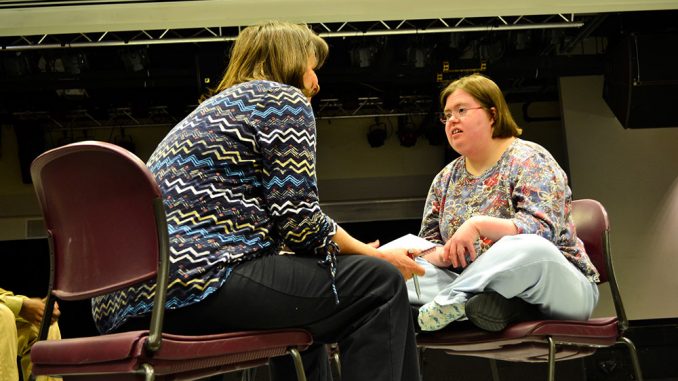
Three years ago at a diner in Philadelphia, three women, two of whom are parents to children with disabilities, were recalling stories from past decades of individuals they knew who were involved in Pennsylvania’s intellectual disability rights movement.
Since many people who were affected by the movement 40 years ago are no longer around to share their experiences, the group realized much of this information was at risk of being forgotten unless it was written down.
One of those women, Temple’s Institute on Disabilities’ co-executive director Celia Feinstein, came up with the idea for a program called Visionary Voices, as a method of preserving the movement’s history.

“Pennsylvania has a unique role in the history of the intellectual disability movement nationwide,” said Lisa Sonneborn, producer of Visionary Voices. “We were the first state to open schools to people with disabilities and the rest of the country followed suit. We have this rich history, but some of the stories were being lost as people got older and passed away, so we wanted to capture as much of that history as we could.”
An advisory committee, comprised of people with disabilities, their family members and advocates at the local and state level, generated a list of 150 people who were leaders of the movement or were directly affected by institutionalization. So far, 60 of them have been interviewed, many of whom are featured in a documentary produced by Visionary Voices that focuses on sharing their experiences.
“What we discovered is that while [documentary presentation] is a format that’s used for other topics such as Holocaust victims or people who were in the Civil Rights Movement, not a lot has been done on disability – certainly on an educational level, but not on individuals directly involved with a movement like this – educators, policymakers and individuals with disabilities themselves,” said Susan Fullam, the institute’s director of Information Dissemination.
Visionary Voices also collaborates with historians, librarians and technicians to maintain a collection of documents that relate to civil rights reforms for the disability community.
Besides the program’s main goal of keeping the movement’s past intact, it also aims to spread awareness about the challenges and rewarding experiences that have accompanied increasing opportunities for the disabled community. Sonneborn said it also has been a way for affected families to bond and appreciate each other.
“Children are looking at the interviews given by their parents and saying, ‘I didn’t know you did that,’ or, ‘I didn’t know how much you had to sacrifice to support your child,’” Sonneborn said. “So to have those conversations within families has been incredible.”
For the past two years, Visionary Voices has presented these stories using public performance in hopes that it will draw people with disabilities and their families to their history. The play, produced by Visionary Voices titled “A Fierce Kind of Love,” has a cast of five actors with and without intellectual disabilities, though Sonneborn said it may soon include four more.
Each time the cast participates in a workshop to practice the work, Sonneborn said, the script expands.
“The play is told in word, movement and song,” Sonneborn said. “So when we do these workshops, we bring stories and have our actors work through them, and what we generate in those workshops will find its way into the word and movement sections of the piece.”
However, the play, which has had a few public performances so far, isn’t intended solely for audiences in the disability community and their advocates.
“When we had the first public reading of our play, nearly half of the audience came to the performance because they were interested in compelling theater, not because they identify with the disability movement,” Sonneborn said. “During a talkback after one public reading, this woman stood up – she was not a member of the disability community and didn’t know anyone from the community – and said, ‘Why are we not being taught this history?’ We hope the project will encourage questions like this.”

David Bradley, director of “A Fierce Kind of Love,” said he believes the play highlights commonalities among individuals in and outside of the disability community. Although the program aims to fully develop the work by the Fall 2016, he said he hopes others continue contributing to the narrative afterward.
“‘A Fierce Kind of Love’ is unique in that the play is actually about the people who are telling these stories,” Bradley said. “I hope it lives on and new stories get added to it, even after we’re finished.”
Sonneborn said through Visionary Voices’ efforts to spark conversation that has sometimes been suppressed or taboo, she hopes it will incite enthusiasm in young people with disabilities and their families, as well as advocates.
“The community today is in a place where it needs to feel empowered,” Sonneborn said. “It has seen significant cutbacks over the last few years at the state and federal level, which has direct impact on people with disabilities and families. The feeling is that people are gearing up for the second phase of advocacy, and it’s nice that they can have a connection with their roots and empower the next generation of advocacy.
Cheyenne Shaffer can be reached at cheyenne.shaffer@temple.edu.


Be the first to comment